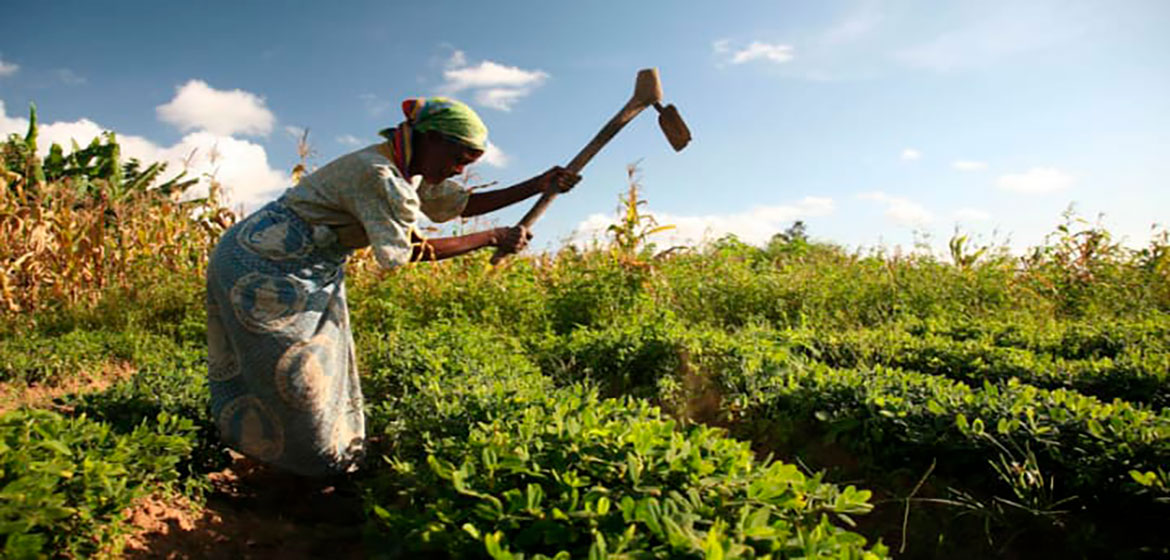By Amy Coughenour Betancourt, Justine Uvuza
Few people dispute the transformational impact of the “green revolution” in agriculture that eradicated famine in countries from Mexico to India just over 50 years ago. But as gains in agricultural production have again begun to slow, there are calls for a second green revolution to meet the growing food security needs of the planet.
Proponents argue for the need to increase yields for the world’s smallholder farmers, who produce 80 percent of the world’s food. These farmers were largely left behind during the green revolution due to the high costs of equipment, inputs, and irrigation systems — and the inequitable distribution of land and secure property rights.
In 2016, Bill Gates described the world as in the midst of a driven by the use of genetic modification and digital technology. Increasing the productivity and profitability of smallholder farmers through these advancements would certainly help combat hunger and poverty. Yet, a growing body of research points to another powerful, often overlooked, lever to help achieve sustainable food security: Women.
Adding new technologies to food production systems alone is not going to bring about the significant uptick in production needed to meet food consumption needs. If we are to sustainably maximize our food production, we must re-imagine the “green revolution 2.0” as a much more equitable one that recognizes the critical role women play in feeding their families and our planet. In the first round, women were by and large bypassed, .
Consider the fact that women make up an average of of farmers worldwide. Despite women’s critical role in producing the world’s food, undermine women’s ability to own, manage, and inherit the land they farm. In Niger, for example, men are five times more likely than women to own land, while in Tanzania, men are three times more likely.
Without secure land rights, women often do not have the security, opportunity, or incentive to invest in their land to improve their agricultural production and their lives. Without land rights, they often cannot access formal credit, agricultural training, and other programs. Women work the land as agricultural laborers instead of farming as owners or managers who invest in tools and other inputs to maximize output over the long-term.
“It has long been understood that in much of the world, women inherit poverty, not property.” —
We must equip women to succeed as farmers by improving their land rights which can help ensure access to credit, technology, training, and inputs. The estimates that if women had the same access to these resources as men, they could increase production on their farms by 20-30 percent, .
shows that secure rights to land for women increases agricultural harvests. But the benefits of women having recognized land rights does not stop there. It improves other areas of their lives and those of their families.
found that women with strong rights to land have healthier children. , studies found that women with secure land earn more. , found that women are more likely to invest in soil conservation efforts.
Studies around the world demonstrate that women with secure land ownership or tenancy often have a stronger voice in household decision-making, which allows them to steer more family resources toward bettering their children’s lives, such as purchasing more nutritious foods or investing in their education. If the economic case for investing in women farmers and their access to land is so clear, why don’t more women own land?
It has long been understood that in much of the world, women inherit poverty, not property.
Widows do not have equal inheritance rights to land by law in 35 countries while many more countries with gender equitable laws tolerate local customs and practices that leave widows landless. A 2011 shows that the death of a male head of household leads to a one-third reduction, on average, in the area farmed by the widow. Many have decried the impact this has on the world’s roughly who depend on them.
The fraught circumstances of today’s female farmers and the impact this has on food production were highlighted most recently by a 2017 , which found that “land investment by married couples is lower in areas where widows do not inherit.”
The devastating impact of denying women their economic rights begins long before a woman loses her husband. In fact, denying women their land rights dampens agricultural investment by both men and women — potentially for decades.
The sheer number of women working in agriculture has brought us to a tipping point. We must recognize that leaving to labor in fields without security, opportunity, and stability not only makes farming families poorer, it makes entire communities less resilient and undermines food security — and that disadvantages us all.
We must reboot our approach to the second green revolution by recognizing that many of our current agricultural interventions and programming ignore or under-invest in women farmers, making their plight even more precarious. And projects that formally document men’s land rights, without recognizing or formalizing women’s claims to the land, deepen inequalities.
Over the last two decades, several countries have made important strides in improving women’s land rights. Rwanda, Kenya, and India have all passed laws to strengthen women’s rights to own, inherit, and manage land. They have also supported policies and programs to make those rights a reality for women by educating customary and local leaders about women’s rights. These programs should be supported and replicated, along with efforts to support the mapping and documenting of women’s land rights to advocate for formal ownership or tenancy.
Join the growing movement to support women farmers around the world. Visit to read the stories of real women from around the world and learn more about organizations such as , , , , , , , , , , , and who are working to help women farmers.
Source:
Related to SDG 5: Gender equality and SDG 2: Zero hunger



